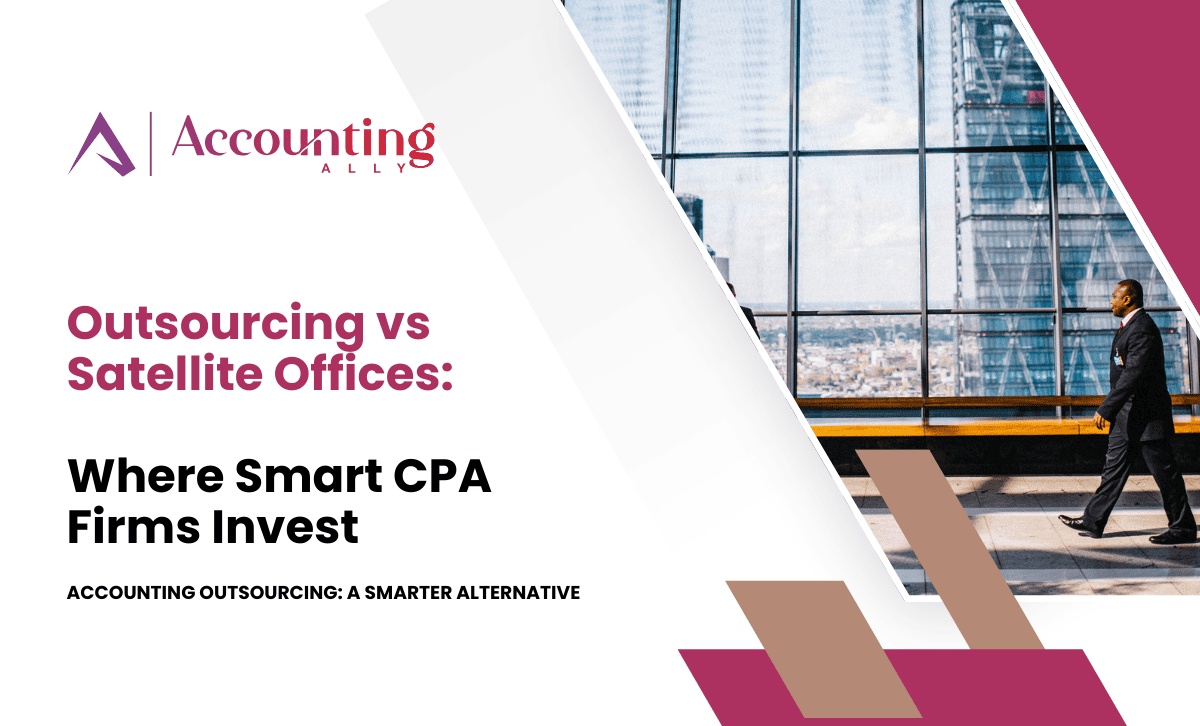Outsourcing vs. Satellite Offices: Where Smart CPA Firms Invest

Amid the ongoing shortage of accounting professionals, CPA firms in the U.S. are increasingly exploring international solutions to bridge staffing gaps.
Some firms have attempted to establish satellite offices in India, a market now favored over traditional outsourcing destinations like the Philippines.
However, this shift is about more than just talent acquisition—it’s about integrating cost-effective strategies to manage rising operational expenses and drive global expansion.
Establishing a satellite office abroad comes with significant challenges, including navigating complex regulations, managing cross-cultural teams, and handling substantial financial investments. These hurdles compel firms to weigh the true costs against potential benefits.
Accounting Outsourcing: A Smarter Alternative
Accounting outsourcing services with Accounting Ally offer more than just cost savings. They deliver scalability, flexibility, and access to a pool of highly skilled professionals without the overhead associated with maintaining physical office spaces.
Additionally, outsourcing partners like Accounting Ally excel in data security and regulatory compliance—critical factors in managing global operations.
Compared to setting up an office in high-cost cities like Mumbai, outsourcing provides better expense control and flexible service options that adapt to demand.
This financial agility makes outsourcing for CPA firms a superior choice for those looking to scale without excessive investment.
Key Insights: Outsourcing vs. Satellite Offices
- Cost Savings: Firms save up to 60% on operational costs by outsourcing instead of maintaining satellite offices.
- Employee Retention: Outsourced accounting firms report 30% higher employee retention rates due to improved work-life balance and optimized workloads.
- Setup Time: Satellite offices require an average of 6-12 months to establish, whereas outsourcing partnerships can be operational within 2-4 weeks.
Why Mid-Sized CPA Firms Prefer Outsourcing
Mid-sized CPA firms, under constant pressure to expand services and grow revenue, find outsourcing more adaptable to their evolving needs than satellite offices. By outsourcing routine tasks, these firms can focus on strategic goals and client relationships.
Outsourcing vs. Satellite Offices
| Aspect | Satellite Offices | Outsourcing |
| Cost | High initial and ongoing costs | Significant cost savings |
| Scalability | Limited by physical infrastructure | Easily scalable based on demand |
| Setup Time | 6-12 months | 2-4 weeks |
| Operational Risks | High regulatory and logistical risks | Managed by outsourcing partner |
Key Trends in Accounting Outsourcing
- AI-Driven Automation: Outsourced accounting firms are leveraging AI to automate repetitive tasks such as data entry, invoice processing, and reconciliation. This not only reduces human error but also enhances efficiency.
- Cloud-Based Accounting: Cloud platforms are increasingly integrated into accounting outsourcing services, offering real-time financial insights and improved collaboration.
- Focus on Cybersecurity: With data breaches on the rise, outsourcing firms are prioritizing ISO certifications and advanced security measures to protect sensitive financial information.
- Customized Solutions: Outsourcing providers are tailoring their services to specific industries and client needs, enabling firms to offer specialized expertise without heavy investments.
Challenges of Satellite Offices
- Regulatory Complexity: Establishing a satellite office involves navigating different tax laws, employment regulations, and compliance requirements. For instance, India’s labor laws and tax codes can be difficult to interpret without local expertise.
- Cultural Differences: Managing a cross-cultural team can lead to communication gaps, affecting productivity and morale. Time zone differences also add a layer of complexity to effective collaboration.
- Financial Investments: Setting up a satellite office requires significant upfront costs, including real estate, infrastructure, and hiring local staff. Additionally, maintaining these offices demands ongoing expenses that can strain budgets.
- Management Challenges: Firms must invest time and resources in training, supervision, and integration, which can detract from core business priorities.
Key Advantages of Outsourcing with Accounting Ally
- Reduce Overhead Without Sacrificing Quality: Outsourcing accounting tasks to India through Accounting Ally significantly lowers fixed costs by eliminating expenses related to real estate, infrastructure, and maintenance. This cost efficiency allows firms to maintain high-quality services while reallocating resources toward innovation and client engagement.
- Scale Operations with Flexible Staffing: CPA outsourcing provides unmatched scalability. Unlike satellite offices that require time and resources to adjust staffing, Accounting Ally can quickly scale support up or down, enabling firms to stay agile and responsive to market changes without the complications of hiring or layoffs.
- Access Specialized Expertise On-Demand: Accounting Ally offers immediate access to specialized talent in areas such as advanced tax law, compliance, and financial technology. This allows CPA firms to broaden their service offerings without investing heavily in internal training or new hires.
- Focus on Strategic Growth: Managing a satellite office can divert attention from core business goals. Outsourcing routine and administrative tasks to Accounting Ally allows firms to prioritize strategic initiatives and client relationships, driving long-term growth.
Conclusion
Outsourcing with Accounting Ally is more than a cost-cutting measure—it’s a strategic decision that drives growth, enhances service quality, and ensures long-term success. Compared to the complexities of managing satellite offices, outsourcing offers unmatched flexibility, access to expertise, and operational efficiency.
By partnering with Accounting Ally, CPA firms gain a trusted ally that provides scalable solutions, industry-leading compliance, and streamlined operations. This makes outsourcing not just an alternative but the smarter, more strategic choice for firms aiming to thrive in today’s competitive market.

